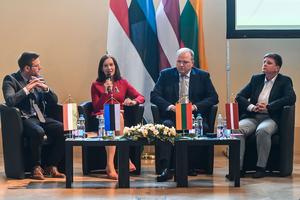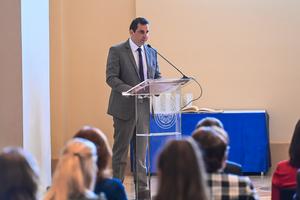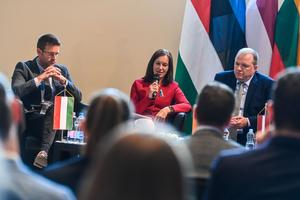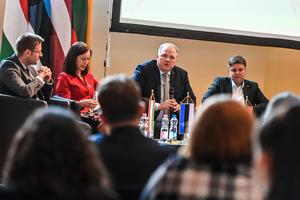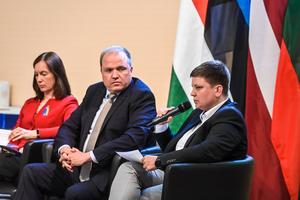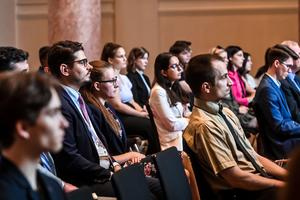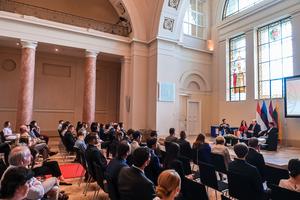On 16 May, the University of Public Service hosted the next Ludovika Ambassadors' Forum. Rector Gergely Deli opened the event, which was a special one as, unlike the earlier forums, the audience could learn the point of view of three ambassadors this time.
The guests of honour of the Forum were H.E. Ms Kristi Karelsohn, Ambassador Extraordinary and Plenipotentiary of the Republic of Estonia, H.E. Mr Vytautas Pinkus, Ambassador Extraordinary and Plenipotentiary of the Republic of Lithuania and H.E. Ms Agnese Kalnina, Ambassador Extraordinary and Plenipotentiary of the Republic of Latvia to Hungary. The Forum's topic was considerably actual: the Ambassadors shared their views regarding the Ukrainian-Russian crisis.
In her speech, H. E. Kristi Karelsohn expressed her strong support for Ukraine, the Ukrainian sovereignty. She commemorated the 50 years of the Soviet occupation. She stressed that although Estonia had regained its independence, the Russian threat had not ceased, and Russia was still not a good neighbour. She evoked the 2007 cyberattacks on Estonia when a series of cyberattacks targeted the websites of the Estonian parliament, banks, ministries, etc., because the country disagreed with Russia regarding the relocation of the Bronze soldier of Tallin, a Soviet-era grave marker and a war grave. H.E. Mr Vytautas Pinkus explained that Baltic states and other neighbouring countries should become independent from Russia economically for security reasons. He highlighted that this objective would not be easy to implement as Lithuania still uses a significant percentage of oil and gas of Russian origin. Still, it is crucial for the future to find other energy sources. In her turn, H.E. Ms Agnese Kalnina concentrated on cybersecurity and defence against disinformation and propaganda. She pointed out that the Russian media was full of propaganda, and the Russian citizens were facing to lack of a global internet connection. She underlined that countries must be aware and resilient to disinformation to preserve their independence and stability.
The keynote speeches were followed by a roundtable discussion moderated by Dr András Örs Hettyey, professor of the Department of International Relations and Diplomacy. Professor Hettyey said that the Baltic states had been the most predictive of a possible Russian attack on Ukraine compared to other countries. He was inquiring how the Ambassadors would explain that information advantage. The Ambassadors agreed that their geographical proximity was an essential factor in being fortelling. Still, according to them, since 2008, Russia has become more and more hostile, as the examples of Georgia and Crimea showed.
Professor Hettyey also asked the Ambassadors about the possible outcome of the war. Although the Ambassadors could not anticipate the future, they presented what the EU or NATO could do to help Ukraine to regain its sovereignty. They underlined the importance of cooperation and unity and appreciated Finland and Sweeden's ambitions to join NATO. Answering Professor Hettyey's last question, they stated that they also would stand for Ukraine's EU accession; however, they added that it could not happen the next day; Ukraine must fulfil the necessary criteria.
The last section of the Forum gave a chance for the audience to ask the Ambassadors. Péter Felföldi, professor in the Department of Public Safety, enquired about how the Ambassadors saw the situation of Russian minorities in their countries. They all agreed that their Russian speaking minorities were to be loyal to them, and they did not expect anything similar to what happened in Donbas.
Péter Krisztián Zachar, Vice-Dean for International Affairs, asked the Ambassadors to indicate one success of their country as a post-communist nation. H.E. Ms Kristi Karelsohn found the digitalisation the most important to highlight, while H.E. Mr Vytautas Pinkus and H.E. Ms Agnese Kalnina mentioned gaining independence and joining the EU and NATO.
As usual, the Forum ended with a standing reception.
Text: Annamária Kitta
Photo: Dénes Szilágyi
